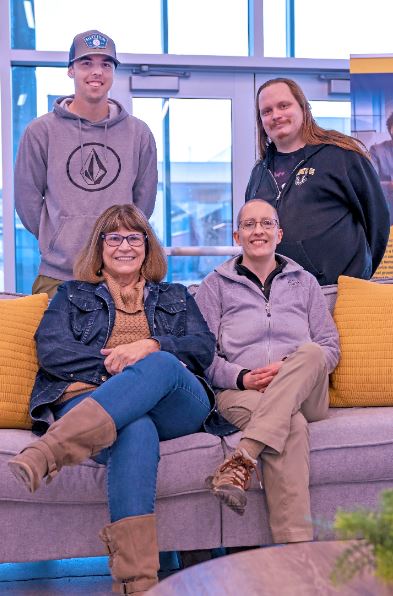
Front L to R Donna Markus, Erin Miller
Oregon Tech Assistant Professor Amber Lancaster, Ph.D., is always looking for ways to involve her students in innovative thinking that takes her lessons in professional writing beyond the classroom. Lancaster believes the more ways she finds to apply her teaching to real life, the better equipped her students are to use their writing skills in their future professions.
To address this in her winter term Project Management for Writers course, Lancaster asked students to think of a "wicked problem" on campus and create a solution. Wicked problems are those that are complex due to a variety of factors, including incomplete information, too many stakeholders, contradictions, or changing requirements. This makes the problem difficult or impossible to solve, and sometimes a single solution does not exist.
"Creating opportunities like the design thinking and wicked problem assignment provides students with authentic learning experience to innovate, critically think, collaborate, solve problems, and make a difference beyond the classroom," Lancaster said.
A team of seniors, including Steven Barton (Renewable Energy Engineering major, Professional Writing minor), Donna Markus (Communication Studies), Duane Munjar II (Professional Writing), and Erin Miller (Professional Writing), collaborated on a design thinking project to address a 'wicked problem' on campus and produce a recommendation report for administration.
"Our team's original intention was to address technology issues across the Klamath Falls campus," Miller said. "After hearing from student, staff, and faculty stakeholders, we determined that mobile hotspots were a feasible means for addressing the most commonly heard complaint: unreliable on-campus internet connectivity and unaffordable internet plans off-campus."
The team's project addressed technology access and equity barriers to learning — mainly for students who live off campus and cannot afford internet, which creates learning barriers to accessing online course materials and submitting homework.
The project proposed establishing a mobile hotspot program that supports and expands the Professional Writing program's mobile usability lab and attracts, retains, and supports a diverse student population within the Communication and Professional Writing programs.
Out of that project, the students worked with Professional Writing Department Chair Franny Howes, Ph.D., to submit an Oregon Tech Foundation equipment grant to fund a mobile hotspot pilot program. The team was awarded the full $11,700 from the Foundation for the program.
"With the mobile hotspot pilot project, we hope to provide students and faculty with a reliable internet source for those that cannot afford internet connectivity or for those faculty who perform field work in locations with spotty internet signals," Miller said.
This technology access program will support 15 Oregon Tech students each term with loanable mobile hotspots for students who can't afford internet service, who reside outside the service area, or who may not be able to fully utilize campus resources if they are employed off-campus and their work schedules conflict with Learning Resource Center and other facility operating hours.
The pilot program directly supports Oregon Tech's Academic Master Plan in various areas, including attracting and retaining students from diverse backgrounds; considering face-to-face, online, and hybrid delivery modalities in programs; and increasing high-impact practices for retention.
Miller said if the pilot project succeeds, the team hopes to expand across the university so a greater segment of the student population will benefit from this popular technology.
###









